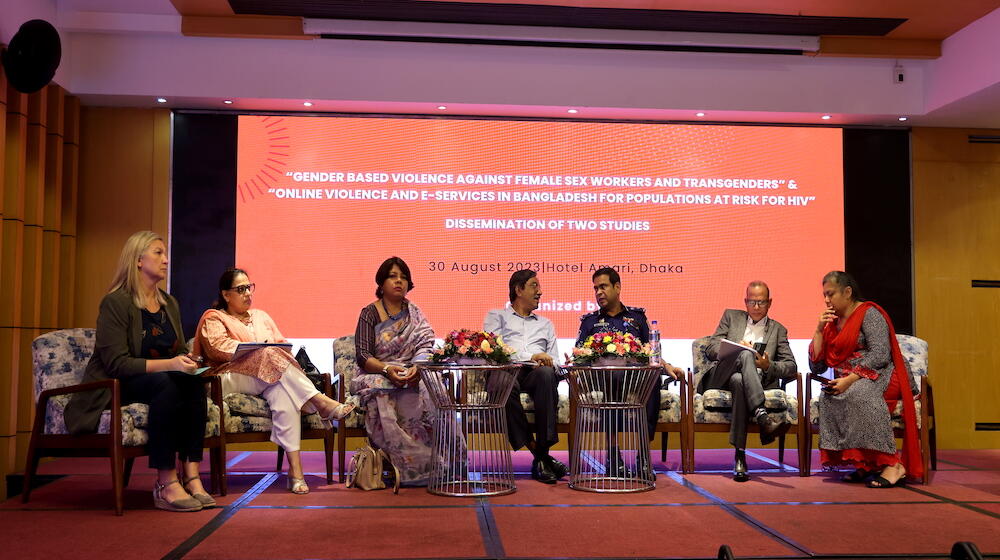Dhaka, 30 August 2023 – Joint UN Programme on HIV/AIDS (UNAIDS), United Nations Population Fund (UNFPA), and Bandhu Social Welfare Society (Bandhu) organized an event to disseminate two studies on “Gender-Based Violence against Female Sex Workers and Transgender” and “Online violence and E-services in Bangladesh”.
The purpose of the event was to discuss the findings of the two studies, reflect on the information revealed about different forms of gender-based violence that transgender and female sex workers are facing, and accelerate progress on how to ensure integrated sexual and reproductive services to end gender discrimination and ensure the respect of human rights for each individual.
The workshop provided an excellent platform for different stakeholders, including the government, development partners, civil society, and the transgender community to delve into data, share results, progress, challenges, and the impact achieved by the country.
Chief Guest, Mr. Kamal Uddin Ahmed, Chairperson, National Human Rights Commission, mentioned that “more sensitization programme from family to field level is needed and Hijra children should be treated like other normal children within the family and at school.” He stressed the coordinated work needed with different government agencies to establish their rights and to give them equal rights for getting justice.
Ms. Kristine Blokhus, UNFPA Country Representative, said “The studies show that female sex workers and transgender people experience violence throughout their lives. Every person, every human being, has the right to the highest attainable level of sexual and reproductive health and rights, and to be free from any type of violence. On behalf of UNFPA, I am proud to be here to commit us to stand on the side of people who are too often marginalized.”
Ms. Gitanjali Singh, Country Representative, UNWomen said “ While I visited Narayanganj and met with female sex workers and transgender persons what came across was pain, anguish, anger, targeting courage and resilience.” The stories of extreme violence, stigma, discrimination shared by some of the very young sex workers and the scars of the physical violence endured were heart-wrenching and deeply disturbing.”
Dr. Saima Khan, Country Director, UNAIDS, mentioned the linkage between HIV and gender-based violence, and she believes that through these studies, we can plan our advocacy to reduce GBV among this high-risk population. Support from different government departments and local-level influencers is required to create an environment where socially marginalized persons can share information and take legal action. She also mentioned that stronger capacity is needed within health services to support marginalized persons and that social protection too, needs to be expanded for better inclusiveness.
The highlights of the studies were discussed by participants, which urged for accelerated, concrete actions that can prevent and respond to gender-based violence towards gender-diverse groups and protect human rights and gender equality.
Among others, Ms. Kazi Zebunnessa Begum, National Commissioner, Bangladesh Girls Guides; Mr. Abu Kalam Siddique, DIG, Tourist Police; Dr. Rahat Ara Nur, Programme Coordinator, UNFPA, also spoke at the event. Professor Dr. Ahmedul Kabir, ADG, Planning and Development, DGHS, chaired the event, and Mr. Shale Ahmed, Executive Director, Bandhu, gave a vote of thanks. Prof. Dr. Md. Nazmul Huq, Department of Statistics, Jahangirnagar University, and Mr. Faizul Karim, independent consultant, presented the key findings. A panel discussion was held after the presentation, where many scenarios of daily harassment faced while accessing health and social services were discussed.


